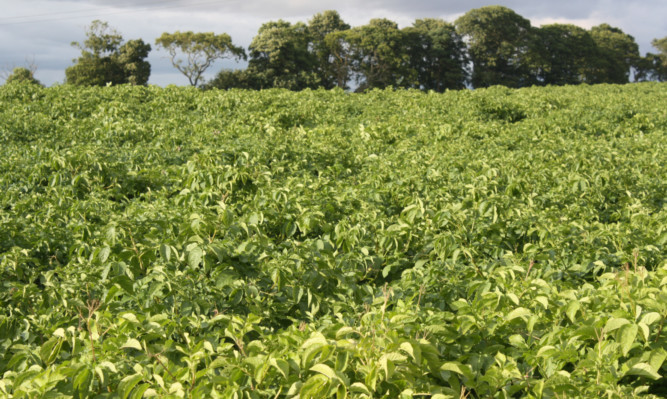One of the riskiest activities in the farming world although it might not look like it is spraying glyphosate anywhere near a growing crop of seed potatoes.
The consequences of spray drift landing on the potato crop can be financially colossal if it results, as it can easily do, in the daughter crop failing.
The risk is at its highest right now with cereal and oilseed rape growers across Scotland busily using glyphosate-based chemicals to dessicate crops ahead of harvest. This work can involve sprayer booms being set high and even deceptively calm conditions can be deadly.
There are, according to sources, a handful of cases every year where seed purchasers find the planted crop fails completely, resulting in what can be a massive loss.
A 10-acre field of seed potatoes might produce 150 tonnes of seed, which would in turn plant 125 acres capable of producing a daughter crop of more than 3,000 tonnes. It is easy to see the multiplier effect. Value the daughter crop at £200 per tonne and the income foregone comes to £600,000.
The legal ramifications of this and other seed-related problems are serious enough for the British Potato Trade Association to have set up a help line (see panel).
The unpredictable effect of glyphosate on potatoes is one of the great mysteries of the farming world.
A full dose of four litres per hectare sprayed straight on to a cereal crop can leave groundkeeper potatoes in the canopy completely unscathed. At the opposite end of the scale, the slightest whiff of spray landing on an adjacent seed potato crop can have devastating consequences.
Greg Dawson, agronomist with Scottish Agronomy said: “Even negligible amounts on the foliage below the limits of laboratory detection can cause failure in the daughter crop.
“There is either delayed emergence followed by much reduced yield or the seed tubers produce “cauliflower sprouts” and come to nothing.
“Where glyphosate drift is thought to have landed on potatoes, it might be better to take the first loss by not selling the crop for seed.
“I am sure insurance companies would rather mitigate the loss before it becomes much greater.”
Rob Beatty of the Forfar office of NFU Mutual confirmed that the company offers a specialist insurance policy with the maximum claim allowable now set at six times the value of the seed supplied and cover of £1m.
“Farmers are aware of the risks and are now fairly good at avoiding problems but there are still one or two claims every year,” he said.
